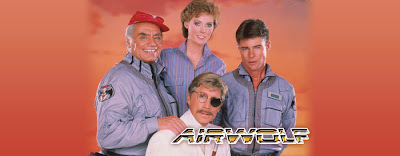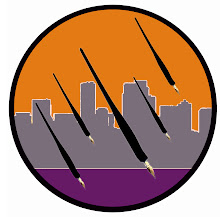I have lost track of the number of full revisions Once We Were Bears has gone through. Which is to say it has been uncountably many.
Friday, August 26, 2011
When Do You Know It's Time To Move On?
I have lost track of the number of full revisions Once We Were Bears has gone through. Which is to say it has been uncountably many.
Saturday, August 20, 2011
Name Game Quiz Answers

Happy Birthday Ray Bradbury!
I’ve written about Ray Bradbury at least a half dozen times on this blog, and Monday 8/22 is his birthday, so I figured I’d just dedicate this post to him.

Some of my first memories of books revolve around Mr. Bradbury. As a small child I recall playing on the floor of my father’s den while my dad read Bradbury books. I could always tell Ray’s books—they were the ones with the skulls and rockets and dinosaurs on the back cover. Even before I could read I was intrigued by what might be inside. Later, when I was finally old enough to start reading on my own, I couldn’t help but gravitate back towards books like “The Illustrated Man” and “Golden Apples of the Sun.” After reading one book I had to move on and read the next.
Ray is one of the many authors who have inspired me as a writer. What do I like most about Ray Bradbury’s writing? Three words come to mind: poetry, darkness and foresight. The images he conjures in his stories are something I aspire to. His vision and ability to see into the dark places in the everyday human world and at times predict the future with his writing are also amazing to me. These words, writing advice from his book, “Zen in the Art of Writing,” hang over my desk as my writing mantra, WORK, RELAX, DON’T THINK.
I could go on and on about his works and accomplishments, but instead I encourage you to check out some of the links below that speak for themselves.
In conclusion—Happy Birthday, Ray! Thank you for all your imagination, inspiration and influence on the world of fiction.
Sam Weller, discusses Bradbury's accomplishments in science fiction
Links to some great Bradbury short stories:
The Veldt (the first holodeck story?)
Ray Bradbury Maternity Shirts
http://www.cafepress.com/+ray-bradbury+womens-maternity
On Writing:
Ray Bradbury on Writing Persistently
Ray Bradbury Quotes:
“You don't have to burn books to destroy a culture. Just get people to stop reading them.”
“Go to the edge of the cliff and jump off. Build your wings on the way down.”
“Don't think. Thinking is the enemy of creativity. It's self-conscious and anything self-conscious is lousy. You can't try to do things. You simply must do things.”
“Recreate the world in your own image and make it better for your having been here.”
“Stuff your eyes with wonder. Live as if you'd drop dead in ten seconds. See the world. It's more fantastic than any dream made up or paid for in factories.”
“Anything you dream is fiction, and anything you accomplish is science, the whole history of mankind is nothing but science fiction.”
“My job is to help you fall in love.” ~ Ray Bradbury
Saturday, August 13, 2011
Thursday, August 11, 2011
RUSH: What They Taught Me About Writing

I finally saw the 2010 documentary, RUSH: Beyond the Lighted Stage about the rock band of the same name http://www.imdb.com/title/tt1545103/
I really enjoyed it—although I was a bit biased going into the film. I’ve seen RUSH in concert at least 3 times during the last 20 years. During my teen and college years I spent many an hour (sometimes while writing and/or doing homework) listening to the fantastic guitaring, drumming and lyrics of RUSH. The movie has some fun cameos featuring various actors and musicians who have been influenced by their music.
As I watched “Beyond the Lighted Stage” I could not help but marvel at their wisdom and how they developed their craft from high school students forming a band to prolific rock legends. Here are a few tidbits I learned from this movie that I think apply as much to writing as to rock and roll.
- Practice, practice, practice
- Have a sense of humor about yourself
- Your art is just one aspect of your life (be it music or writing)
- Your health and well being are more important than your art
- Build on known stories and mythos
- Good friends can help you succeed
- It’s not about the booze, drugs and chicks
- Go for your passion
- Don’t focus on making money
- Ignore expectations of others
- Be true to yourself/don’t cater to what sells and you’ll succeed
- Read – it’s good for your writing/lyrics (Neil Pert)
- A large nose can come in handy (Geddy Lee)
- Humility is a good thing
- Always be open to new influences
- You can always learn something new
- Be aware of what you have—and appreciate it
- Hard work & virtue are rewarded
- Some of my favorite RUSH songs:
The Trees: http://www.youtube.com/watch?v=k4amV7__XFA
La Villa Stangiato: http://www.youtube.com/watch?v=78D00dYOBrM
Closer to the Heart: http://www.youtube.com/watch?v=BEgXe-gQxX4
Spirit of the Radio: http://www.youtube.com/watch?v=wm0hSUs6giA
Red Barchetta: http://www.youtube.com/watch?v=EMtTJS3YcMc
Help RUSH into the Rock and Roll Hall of Fame: http://www.facebook.com/pages/Lets-get-RUSH-into-the-Rock-and-Roll-Hall-of-Fame/102414003128378
Friday, August 5, 2011
The Name Game


Tuesday, August 2, 2011
On Diversicon and the Success of Amanda Hocking
No, that isn't the start of a really poor joke, that's what happened at Diversicon last weekend. The Scribblerati were there, as were some of the Wyrdsmiths and several others. We, The Scribblerati, hosted a panel on writing groups and then we attended several other of the sessions. It was our first con and we’re all glad we went, but now that we have dipped our toes into the great pool of con-dom (get your mind out of the gutter) we’re ready for more. I think Wiscon or Convergence might be in our future. Stay tuned!
Among the many things I heard at Diversicon, one offhand comment really caught my attention. The comment was made about self-publishing and was made in a rather disdainful in tone. It went something like this, “there's a clear difference in quality of self published books.”
The Diversicon comment wasn't the first time I've heard that opinion about the quality of self published books. I've done a lot of research on self-publishing because, as longtime readers of this blog know, I have been thinking long and hard about self-publishing my WIP, To Kill the Goddess. But one thing I hadn't done (until recently) is actually buy a self published book and read it. So, a few weeks ago, I decided it was time to check out some of the competition. Who better to start with then someone who has turned themselves into a millionaire by self-publishing?
I chose Switched (Tryelle Trilogy, book 1) by Amanda Hocking.
At this point I've only read about half of Switched. The story is put together well and the technical/grammatical editing is actually pretty good (although not as good as what I'm used to seeing in print) but there is, IMHO, room for improvement. In fact, there are things in this book that would be called out in a Scribblerati critique session. And speaking of the Scribblerati, I’m willing to go on the record as saying that everything we are currently turning out is just as technically well written, if not better, than Switched.
So maybe the person at Diversicon who made that comment was somewhat right, at least in this case, but I think they are missing the point. Amanda Hocking may not have written the best book I've ever read, but neither was it the worst and, if you ask me, I think Amanda Hocking is brilliant. She has made a boatload of money off the Tryelle Trilogy and I don't care how you slice it, that is nothing if not brilliant.
It's also, in my opinion, not terribly surprising.
One thing I think that we writers are is perfectionists. I mean, we are artists and artists tend to be highly critical of their own work. I'm no different. We tend to look at our art and say we need to make it the absolute best it can be and while that's great, the lesson that Amanda Hocking's success is giving us is that it's not necessary to be great.
I think this is something that people in the movie and music business have known for a long time. You and I both know a lot of money has been made off less than perfect songs and movies. Similarly, Amanda Hocking is telling us that we writers don't need to write War and Peace in order to be hugely successful. We just need to write something that's “good enough.”
If you stop and think about it, this notion of “good enough,” combined with our ability to self-publish something that falls into that category, is actually quite a revelation. Please don't misunderstand me, I'm not advocating a new world order where books are full of spelling errors, poor grammar, and disconnected plot threads. But maybe we writers should take a look at Amanda Hocking’s success and think about “good enough” the next time we’re staring down the face of a contract that pays a fraction of what we could earn by self-publishing.
After all, I imagine that after Amanda Hocking reads reviews that call into question the quality of her work, she laughs all the way to the bank.
--------------------------------------------------
UPDATE 8-13-2011
I like to maintain a positive attitude toward self-publishing, which can be challenging given how many people out there bagging on it. But today I am bummed out because just had a brief yet interesting twitter exchange with @jane_l regarding a HORRIBLE self-pubbed book (you can find the review here, but I don't recommend it because of the subject matter involved).
I think it's one thing to self-pub a novel with a few grammatical errors, or one that may not be as polished as it could be, but it's another thing entirely to self-pub something that's just awful.
As someone who would like to self-pub someday, that makes me mad. What is the likelihood that someone would take a chance on my self published novel after reading something as horrible as the book mentioned above?
Clearly, self-publishing, should I choose to go that route, will be challenging.


